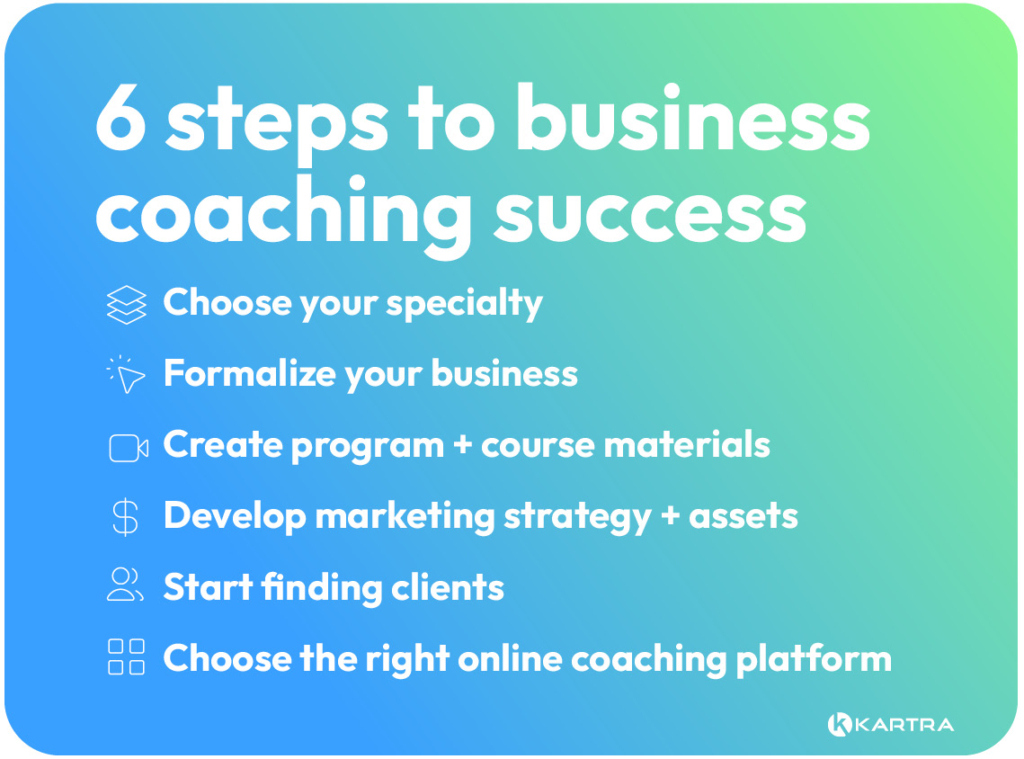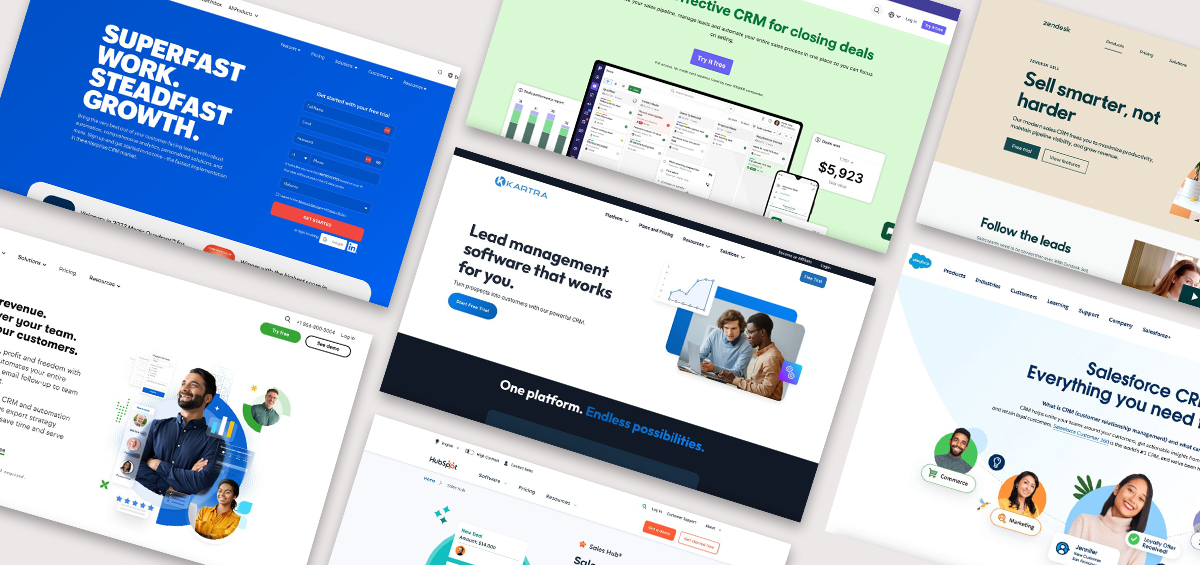Business coaches continue to find new opportunities to build an online business because of the positive impact of technological advancements. What was once primarily offered through in-person workshops and seminars is now delivered globally, conveniently, and on-demand through the power of the Internet.
If you’re looking to become an online business coach – or ready to take your coaching business to the next level – this guide will teach you what exactly you should do to get started, how to market your business coaching services online, and what to look for in a business coaching platform.
What does a business coach do?
An online business coach helps entrepreneurs, executives, and new business owners identify and overcome roadblocks and challenges so their businesses and careers can grow. They do this through one-to-one coaching, courses, and group mentorship, all delivered online.
People hire business coaches to help them overcome problems stunting their business growth. For example, coaches can provide training to sales teams, executive coaching for managers and directors on motivating employees, mentor startup founders, and create succession plans for eventual retirement. Some coaches create marketing plans that help companies grow market share in a new industry.
To deliver their online coaching services, most business coaches create customized action plans, programs, and online courses. As online coaching becomes commonplace, more coaches find that offering standardized solutions – along with some individual coaching options – helps them better serve their clients’ needs while increasing their ability to “earn on autopilot.”
What skills should a business coach have?
While most of a coach’s job is to advise on business initiatives, excellent communication skills are essential. Business coaches often must listen and navigate an array of issues their clients may have. Business coaches often provide what feels like practical life wisdom in addition to strategic business planning.
Who can become a business coach?
Anyone with a proven background in business growth can become a business coach. A degree in a business-related field (like an MBA) or relevant certification can be helpful, but actual business experience is the most requested skill set.
The best business coaches are often entrepreneurs who have previously started their own businesses or risen to an executive position. Their background gives them insights into challenges and opportunities they can share with fellow business owners. It also builds trust from fellow business owners because they’ve been there and done that.
Growth trends for online business coaching
The online coaching industry, including business coaching, has existed for well over 15 years. However, it exploded in popularity with COVID and the rise of remote work as business owners realized the need for virtual resources instead of just in-person training. Coaches who prioritized online growth and pivoted their programs for the virtual environment were among the most successful.
Business coaching forecasts for 2025 – 2030 call for continued growth, albeit at a slightly slower pace due to inflation slowing business spending. As more and more businesses of all sizes see the value in business coaching, new coaches should expect a competitive but growing market with growth for many years to come
6 Steps to Becoming a Successful Online Business Coach
New to the online business coaching world? Follow these key steps to ensure you get up and running successfully – and so you stand out from a crowded market.

1. Choose your specialty
Online business coaches have two paths: becoming a generalist or finding a niche as a specialist. We’ll break down the differences and provide our recommendations.
Generalist business coaches
A generalist online business coach works with businesses of all types. At the start, many coaches choose this route because it feels simpler with a lower barrier to entry. While this could be true, generalist business coaches often struggle because they offer neither a specialized business service to help with (like sales, marketing, or recruitment) nor do they display experience in a specialized industry. This can lead to lower sales and unpredictable outcomes.
Specialist business coaches
On the other hand, specialized business coaches have a specific niche they service. They might work with businesses in multiple industries but on a specific task like sales or recruitment. Or, they could offer a fuller suite of services but targeted at an industry with which they are familiar. Either way, their niche allows them to market and attract clients because they know what they do and who they help. Specialists often command higher compensation and can set their own terms.
While both of these options are viable for beginners, we recommend choosing a specialty based on your experience. If you’ve spent time in a particular industry or have proven solutions for a problem facing business owners, center your marketing and messaging around that area for quicker growth.
Coaches vs. Consultants
If you do an online search, you’ll often see “business coaches” and “business consultants” used interchangeably. There can be overlap between the services coaches and consultants provide, but there is a general distinction.
It’s helpful to think of a business coach as someone who helps people overcome challenges by leading them through systems the coach has developed. Coaches offer programs and training, and they also tend to include one-to-one or group options as part of their business model.
A consultant is typically lighter on the “mentoring” side, instead offering more tailored solutions to solving a specific business problem. And a consultant is more likely to operate using fixed-scope projects.
2. Formalize your business
Create a business plan
If you’re embarking on a business coaching venture, chances are you’ve helped someone develop a business plan before! Now is the time to take your own advice. In your plan, you can hash out your business ideas, put together sales projections, analyze the industry you’re targeting, and set realistic business goals.
Choose your business model
One of the first decisions you ought to make is selecting the right business model for your online coaching services. This choice can significantly impact your income potential, client interactions, and operational approach. Here are three common options for online coaching programs:
- One-on-one coaching: This model involves working directly with individual clients by offering private coaching and personalized support. It’s straightforward to set up but may limit your income potential due to time constraints.
- Group coaching programs: This approach allows you to work with multiple clients simultaneously, potentially increasing your income while providing a collaborative learning environment for your clients.
- Course-led programs: Some coaches prefer to create courses and programs and deliver them online. For instance, a business coach who offers marketing strategy might create a course that delivers the majority of their training.
Often, business coaches prefer a hybrid model where they combine these offerings. It allows them to do brief check-ins and build personal relationships with some students while also monitoring their progress through a specific course.
You’ll also want to choose how you engage with your clients. Will you be doing an hourly rate, monthly retainers, or project-based work? Most business coaches start with an hourly rate because it’s easy for clients to understand and agree to. But keep in mind that your ability to scale your business is limited when every hour is billed.
A retainer, while more scalable than an hourly rate, also means you need to be firm and clear about deliverables and expectations with clients. The project-based model can be the most lucrative of all of these, but it’s something more experienced coaches move towards as they prove their value and understand how long and what it takes to successfully deliver a project.
Set up your payment systems
As an online business coach, you’ll need reliable and secure methods for clients to pay for your services. Some coaches start out running business charges through their personal bank account, but that gets messy when it comes to taxes and accounting. Here are some things to consider as you get started:
- Register your business in your city/state including choosing a business name and obtaining any necessary licenses and permits
- Set up a business bank account to separate your business payments from your other personal accounts. Your accountant will thank you.
- If you’ve already worked out a membership program or have a course ready to sell, congrats! Kartra’s membership platform provides an integrated payment system, allowing you to handle invoices and payments, set up subscriptions, accept payment via PayPal or credit card, and offer discounts and promotions with ease. Thousands of coaches trust our secure payment gateway.
These tips provide the beginning steps to take as you establish your business coaching practice. If you’re unsure how to get some of these done, there are a number of consultants and professionals who help small business owners take care of this work.
Consider business coaching certifications
Becoming a certified business coach can separate you from the rest of the competition. Even if you have an MBA or have held the position of CEO, a certification within a specific industry or skillset can attract the right clients to your business.
To get certified, look for training programs. From community-oriented programs like CoachBuilder to more professional coaching certification programs from the Professional Business Coaches Alliance and the International Coaching Federation (ICF). There are even affordable courses from platforms like Udemy that provide more of a general introduction to business coaching.
If you’re servicing a specific niche, find certifications that are relevant to your industry and that might make your business services more attractive to prospective clients. For example, a business coach who works with franchises and franchisees could get their CFE, which is a recognized certification that will build trust and credibility.
3. Create program materials
Creating engaging and effective program materials is crucial for your coaching business. Start by evaluating what is needed to implement your business model. Will you be meeting 1:1? Will clients be working through a self-paced program? Or a combination? Be sure to carefully develop your program to reflect your mission and meet client needs.
Outline your core methodology
Your core methodology is the specific process or framework you use to help clients achieve results. Your framework sets you apart from the competition and is what convinces clients that working with you will enable them to achieve their desired results.
Develop content that supports your methodology
Break your content into two key categories: teaching materials that explain concepts and frameworks and application materials that help clients implement what they’ve learned. For example, you might create teaching videos that explain leadership principles, paired with practical worksheets that help clients apply those principles to their own teams.
Implement mixed-media formats
Your program materials should include a mix of formats to accommodate different learning styles and engagement levels. Consider creating video presentations for key concepts, downloadable templates for common business processes, implementation checklists, and quizzes or assessment tools that help clients measure their progress. Many successful coaches also develop workbooks or playbooks that guide clients through their methodology step-by-step.
Brand all your materials consistently
Remember to use consistent branding – this reinforces your professionalism and helps clients feel they’re getting a cohesive, premium coaching experience. It’s worth your time and resources to implement your brand across all your materials.
4. Develop a marketing strategy + assets
So far, we’ve focused on taking care of the basics of setting up a business: a domain name, a website, and a visual identity for your business. Now, let’s build on this foundation with marketing ideas so your coaching business can get real traffic and leads.
Establish your online presence
Once you’ve chosen your business model, you’ll need to establish your online presence. While many coaches skip over this part or treat it as optional, we recommend starting strong so your business can take off. Here are some basic things to consider:
- Choose a memorable domain name. We recommend trying to get a “.com” whenever possible, but .net, .io, and .co are also options.
- Set up a professional website. Your website will give people a way to contact you and learn about your coaching options. Make sure the website builder you choose is easy to use and integrates with other digital marketing tools you’ll use as your business grows. More about this in the next section.
- Create social media profiles on relevant platforms. You probably don’t need to be on every platform, so choose the ones that fit your audience. Most coaches utilize LinkedIn and Facebook for business marketing. Ensure that your profiles are professional and consistent with your brand and showcase your coaching expertise.
Remember, your online presence is your virtual storefront, so invest time in creating a polished and professional image that resonates with your target audience.
Design a professional website
Online business coaches are going to drive traffic to a website. While it doesn’t need to have all the bells and whistles, a website should be treated like a money-making tool.
Your website should clearly communicate your value proposition, showcase your expertise, and make it easy for potential clients to contact you. Don’t get stuck here. This is just the first iteration of your website – as you grow, your website will grow with you. Include the following elements:
- A compelling “About” section that highlights your experience and credentials
- A services page that clearly outlines what you offer
- Case studies or testimonials from satisfied clients (as you acquire them)
- A blog or resources section to demonstrate your knowledge and provide value
- Clear calls-to-action (CTAs) for scheduling coaching sessions or signing up for your mailing list
Create business collateral
While most of your marketing and sales might happen in the digital world, having professional business collateral can set you apart from other online coaches. Invest in:
- Business cards with a clean, memorable design
- A professional email signature with your contact information and website
- Branded proposal and coaching package templates
- A digital brochure or one-pager outlining your coaching services
These materials not only make you look more professional, but also serve as valuable tools for networking and client presentations.
Start an email newsletter
Building an email list is one of the most effective ways to nurture relationships with potential coaching clients and stay top-of-mind with your network.
To actively grow your list, many coaches create a lead magnet – such as an ebook, free mini-course, or complimentary strategy session – and place it on their website to encourage sign-ups. Then, you can follow up with a regular newsletter that provides value to your subscribers while subtly showcasing your coaching expertise and services.
Develop a content strategy
Establishing yourself as a thought leader in your coaching niche can significantly boost your credibility and attract clients. Consider the following content marketing strategies:
- Write guest posts for business and entrepreneurship publications
- Use your knowledge to write SEO content for your website that drives organic traffic
- Create in-depth guides or whitepapers on topics relevant to your target audience
- Start a podcast or YouTube channel to share your coaching insights
- Develop case studies that showcase your successful client engagements
When you consistently produce high-quality content, you’ll improve your visibility and demonstrate your coaching expertise to potential clients.
Utilize a sales funnel
While these marketing strategies and ideas are sure to generate awareness and traffic, you need a way to turn those website visitors into qualified leads. That’s where a sales funnel comes in.
Funnels are built-out marketing stages that companies move prospective customers through. They traditionally start by attracting clients with a lead magnet of some sort – perhaps a webinar or a free template – which they get in exchange for their email address.
From there, funnels are designed to inform and influence prospects about your business and why they should consider using your services.
If you’re curious about funnels, we have an entire article that walks through what sales funnels are and how you can build one for your coaching business.

Learn how to build an effective sales funnel
5. Start finding clients
Many guides will give you impractical or expensive ideas for finding coaching clients. As a new online business coach, you probably want to keep your expenses low, so these tips will help you build your pipeline and get your first clients – even on a limited budget.
Reach out to your existing network.
The best place to start when building your online coaching business from scratch is with people in your network who could use your services. The more people who know about your coaching business, the better. Reach out to past colleagues and connections to see if they know anyone who could benefit from your coaching.
Don’t be shy about leveraging your professional network – many successful online coaches build their initial client base through word-of-mouth referrals from former coworkers, managers, or industry contacts. Be clear about the value you can provide and ask for introductions to potential clients or referral partners.
Build a social media presence
Another great way to find clients is to get active on social media to build a following. We’re not talking about becoming an influencer exactly, but there’s plenty for new online business coaches to gain from an active social media presence.
Many coaches find LinkedIn to be a valuable resource for sharing content and connecting with potential clients. Develop a content strategy that showcases your coaching expertise and provides value to your target audience. Engage with others’ posts, participate in relevant groups, and use LinkedIn’s publishing platform to share longer-form content.
Other platforms like X (formerly Twitter), Instagram, or even TikTok can be valuable depending on your coaching niche and target audience. Choose the platforms where your ideal clients are most active and tailor your content to each platform’s strengths.
Get reviews
One of the main barriers to a thriving coaching business is not having enough reviews. As you service your clients and help their businesses grow, ask for reviews that address common pain points your prospective clients might have.
You can also create case studies where you not only capture a review from a client, but also scientifically detail the journey you took with them. Case studies are among the most popular sales and marketing tools in the B2B world.
Partner with other professionals in your network
Collaborating with other coaches or complementary service providers can be a great way to expand your reach and access new clients. Look for professionals who serve the same target market but offer different services. For example, if you’re a business strategy coach, you might partner with marketing consultants, financial advisors, or productivity coaches.
Consider creating referral agreements or even developing joint coaching packages that provide more comprehensive solutions to your clients’ challenges.
Attend virtual and in-person events
While digital marketing is essential, remember the power of online and face-to-face networking. When possible, connect with potential clients and referral partners at industry webinars, virtual summits, and local business events. Some tips for successful networking:
- Prepare a concise, compelling elevator pitch about your coaching services
- Have a digital business card or easy way to share your contact information
- Focus on building relationships rather than hard selling
- Follow up with new contacts promptly after the event
You can speak at virtual events or host online workshops to showcase your coaching expertise and attract potential clients.
6. Choose the right online coaching platform
If starting an online coaching business sounds daunting, don’t worry. It doesn’t have to be. While most coaches stitch together various software for email, websites, and CRM, Kartra’s all-in-one marketing platform has all the tools you need – all in one convenient place.
For coaches with a course-based approach, Kartra’s platform was built specifically with you in mind. Coaches can create everything from multi-tiered lesson plans to scaled programs and even mini-courses, all within Kartra. Courses can be dripped out, and coaches can see completion reports and analytics.
If you need solutions for growing your online business coaching practice, Kartra’s suite of marketing tools, including email marketing, lead capture forms, CRM, and sales funnel creator tools integrate seamlessly together.
Get started today.


